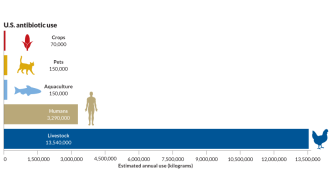Earth
Sign up for our newsletter
We summarize the week's scientific breakthroughs every Thursday.
-
 Environment
EnvironmentArtists’ sunsets may reveal past pollution
The colors artists used in the sunsets of their paintings may provide clues to what was circulating in the air hundreds of years ago.
-
 Climate
ClimateNatural climate shifts affect sea level rise
A recent dip in the rate of sea level rise may be due to natural climate variability.
-
 Climate
ClimateKangaroo gut microbes make eco-friendly farts
Understanding kangaroos’ low-methane flatulence could help researchers lower greenhouse gas emissions from livestock.
By Beth Mole -
 Planetary Science
Planetary ScienceHow Earth’s radiation belt gets its ‘stripes’
The rotation of the Earth may give the planet's inner radiation belt its zebralike stripes.
-
 Climate
ClimateClimate change may spread Lyme disease
The territory of the ticks that transmit Lyme disease is growing as the climate warms.
By Beth Mole -
 Earth
EarthHow the Chicxulub impact made acid rain
Using lasers to accelerate materials to asteroid-like impact velocities, scientists have shown how the Chicxulub asteroid impact, which happened roughly 65 million years ago, could have created a mass extinction in the oceans.
-
 Climate
ClimateWarm, wet weather may have helped Genghis Khan rule
Mild, wet weather — not drought — may have helped Genghis Khan expand the Mongolian empire to the largest in human history.
-
 Physics
PhysicsShifting grains may explain earthquake lightning
Mysterious lightning before or during earthquakes could get its spark from underground shifting.
By Andrew Grant -
 Animals
AnimalsSpotted seals hear well in and out of water
Spotted seals, native to the northern parts of the Pacific, hear frequencies that may mean they are susceptible to the effects of anthropogenic noise.
-
 Climate
ClimateCloudy forecast
Over decades climatologists have grown more confident in their projections of the future impact of greenhouse gas emissions. But whether shifts in cloudiness will amplify global warming continues to vex researchers.
-
 Agriculture
AgricultureWhere antibiotics go
Of the 51 tons of antibiotics consumed every day in the United States, about 80 percent goes into animal production.
-
 Climate
ClimateExtreme heat on the rise
Recent years saw an increase in peak high temperatures on land despite Earth’s stalled averages.
By Beth Mole